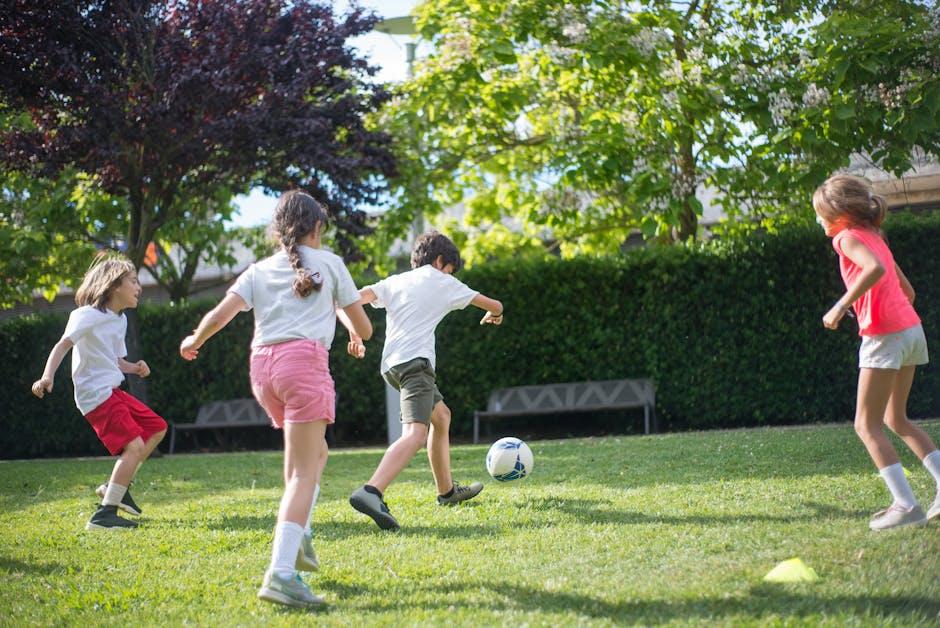In recent years, the intersection between physical activity and cognitive development in young children has garnered significant attention from researchers and educators alike. As childhood obesity rates rise and educational benchmarks become increasingly stringent, understanding the role of physical activity in cognitive growth is more crucial than ever. This article delves into the best physical activities that not only promote physical health but also enhance cognitive abilities in young children. By analyzing current studies and expert opinions, we aim to identify activities that stimulate brain development, improve concentration, and foster problem-solving skills. Through a confident examination of the evidence, we will uncover how strategic physical engagement can lay a robust foundation for lifelong learning and mental acuity in children.
Understanding the Link Between Physical Activity and Cognitive Growth
Recent studies have illuminated the profound impact that engaging in physical activities can have on a child’s cognitive development. When children participate in physical exercises, they don’t just enhance their physical abilities but also stimulate brain growth and function. This is largely due to the increased blood flow to the brain, which promotes neurogenesis and enhances synaptic plasticity. Engaging in activities that require coordination, balance, and agility can particularly boost areas of the brain associated with executive functions, such as problem-solving and memory.
To foster this growth, it is essential to incorporate a variety of physical activities into children’s routines. Some effective activities include:
- Obstacle courses: These activities require children to plan and execute complex movements, enhancing their problem-solving skills.
- Dance and rhythmic activities: These not only improve coordination and balance but also promote creativity and emotional expression.
- Sports such as soccer or basketball: Team sports are excellent for developing social skills alongside cognitive functions like strategic thinking and concentration.
- Yoga and stretching exercises: These activities encourage mindfulness and body awareness, which can enhance focus and emotional regulation.
By integrating these activities into daily routines, parents and educators can effectively support children’s cognitive development, setting a strong foundation for lifelong learning and growth.
Enhancing Memory and Focus Through Play-Based Exercises
Integrating play into physical activities not only stimulates young children physically but also significantly boosts their cognitive abilities. Engaging in imaginative play, such as building with blocks or creating narratives with toys, enhances memory retention by encouraging children to remember and organize sequences of events. This type of play requires children to plan, negotiate roles, and follow rules, which exercises their working memory and decision-making skills. Furthermore, games that require focus, such as “Simon Says” or “Musical Chairs,” sharpen attention spans and improve impulse control, essential components of cognitive development.
Incorporating outdoor adventures like treasure hunts or obstacle courses can be particularly effective. These activities demand strategic thinking and spatial awareness, as children must navigate their surroundings and remember the locations of various objects or paths. Additionally, interactive group games such as “Red Light, Green Light” or team-based sports cultivate social skills alongside cognitive development. These exercises require children to listen, process information quickly, and adapt to changing scenarios, all while fostering teamwork and communication. By seamlessly blending physical activity with cognitive challenges, children can enhance their memory and focus in a fun, engaging manner.

Developing Problem-Solving Skills with Structured Movement Activities
Integrating structured movement activities into a child’s routine can significantly enhance their problem-solving abilities. These activities require children to think critically and adapt to new challenges, which strengthens their cognitive development. Obstacle courses, for instance, are a fantastic way to encourage strategic thinking. Children must navigate through various obstacles, requiring them to plan and execute their movements thoughtfully. This not only promotes physical coordination but also enhances their ability to solve problems on the fly.
Another effective activity is yoga for kids. While yoga is often associated with relaxation, it also encourages children to focus on their body movements and breathing. This mindful practice can improve their concentration and decision-making skills. Additionally, treasure hunts can stimulate cognitive growth by requiring children to use clues to find hidden objects, fostering their ability to think ahead and make connections. These structured activities are not only enjoyable but also serve as powerful tools for developing young minds.

Recommendations for Age-Appropriate Physical Activities to Boost Brain Development
As children transition into early school age, incorporating structured sports and team-based activities becomes beneficial. These not only improve physical fitness but also teach valuable lessons in teamwork and strategy. Soccer, basketball, and relay races are perfect for this age group, promoting executive function skills like planning, attention, and task-switching. Additionally, yoga and mindfulness exercises can be introduced to enhance focus and emotional regulation, contributing to a well-rounded cognitive development process.



